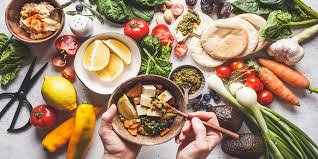Advertisements
Adopting sustainable eating practices is more than a trend; it is an urgent need for the health of the planet and future generations. In a world where natural resources are finite and the environmental impact of food production is increasingly evident, it is essential to rethink our food choices. In this context, sustainable eating stands out as a viable and responsible alternative, allowing each of us to contribute to environmental preservation and social well-being.
Throughout this text, we will explore valuable tips for adopting a more sustainable diet, covering everything from ingredient selection to waste reduction. The focus will be on practices that not only benefit the planet, but also improve the quality of life and health of consumers. The goal is to provide a clear and practical view of how small changes in eating habits can have a significant impact.
Advertisements
In addition, the focus will be on the role of organic, local and seasonal foods in promoting sustainable eating. These foods, grown in a way that minimizes the use of pesticides and transportation, are essential to reducing the carbon footprint and promoting more ethical and fair agriculture. By choosing these products, we contribute to a more sustainable production chain and help to foster local economies.
Finally, the discussion will focus on emerging trends in sustainable food, including technological innovations and new business models that are transforming the sector. The idea is to inspire concrete actions that can be adopted in everyday life, facilitating the transition to a more conscious and sustainable diet. 🌱 Join this journey towards a greener and healthier world.
Advertisements

Understanding the Concept of Sustainable Food
Adopting a sustainable diet is an essential step towards taking care of our health and the planet. This concept involves choosing foods that respect natural resources, promote the well-being of communities and reduce environmental impact. Sustainable eating refers not only to what we eat, but also to how these foods are produced, processed and transported.
Sustainable foods are generally produced locally, with fewer natural resources and fewer pollutants, which contributes to reducing greenhouse gas emissions. In addition, sustainable food also involves choosing products that promote the well-being of workers and agricultural communities. By making conscious food choices, we are not only taking care of our bodies, but also of our environment and society.
For many, the concept may seem complex or difficult to implement in everyday life. However, small changes can make a big difference. By choosing sustainable foods, such as organic, locally sourced and responsibly produced products, we contribute to a healthier future for our planet and future generations. 🌍
Tips for Choosing Sustainable Foods
Choosing sustainable foods doesn’t have to be a complicated task. Here are some practical tips to help you make more informed choices:
Prefer Local Products
One of the most effective ways to adopt a sustainable diet is to opt for local products. Foods that are grown and produced close to your home generally require less transportation, which means fewer carbon emissions. Plus, by buying from local producers, you support your local economy and contribute to the development of local communities. 🥦
Visit farmers markets and local markets, where you can find fresh, seasonal fruits, vegetables, and other produce. In addition to being more sustainable, these foods are often more flavorful and nutritious because they are picked at the peak of their freshness.
Choose Organic Foods
Organic foods are grown without the use of chemical pesticides or synthetic fertilizers, making them a healthier choice for you and the environment. Organic food also helps preserve biodiversity and soil health. By choosing organic, you are contributing to farming practices that respect nature.
While organic produce may be a bit more expensive, consider the positive impact it has on the environment and your health. Buying directly from local farmers can often provide you with organic produce at a more affordable price. 🍎
Reduce Meat Consumption
Meat production has a significant environmental impact, contributing to greenhouse gas emissions, deforestation and excessive water consumption. Reducing meat consumption and opting for plant-based alternatives can be a powerful way to adopt a more sustainable diet.
Try incorporating more vegetarian or vegan meals into your weekly diet. Try new recipes that use legumes, whole grains, and vegetables as a base. Not only does this benefit the environment, but it can also provide a variety of essential nutrients for your health. 🥗
The Positive Impact of Sustainable Food on Health
In addition to benefiting the environment, sustainable eating also has numerous health benefits. By choosing fresh, local, and organic foods, you are eating products that are richer in nutrients and free from chemical residues.
More Nutrients and Less Toxins
Fresh, organic foods often contain more vitamins, minerals, and antioxidants than conventionally produced foods. This translates into better nutrition and a stronger immune system. Plus, by avoiding pesticides and chemical additives, you reduce your intake of harmful toxins.
Eating local and seasonal foods also ensures that you are eating products that have not been stored for long periods, maintaining their nutritional quality. 🌱
Promoting a Balanced Lifestyle
Sustainable eating is intrinsically linked to a balanced and healthy lifestyle. By prioritizing whole, fresh and minimally processed foods, you are more likely to maintain a healthy weight, improve digestion and increase energy and disposition.
Reducing meat consumption and increasing your intake of vegetables and whole grains can also help prevent chronic diseases such as diabetes, heart disease, and certain types of cancer. A diet rich in plant-based foods is often associated with a lower risk of disease and a longer life. 🍃
Challenges and Solutions in Adopting a Sustainable Diet
While sustainable eating has many benefits, the transition can be challenging. Recognizing these challenges and finding practical solutions can make the process more accessible and less intimidating.
Financial Barriers
One of the main challenges is the cost of organic and sustainable foods, which are often more expensive than conventional ones. However, there are strategies to make these products more affordable:
- Buy from local markets or farmers' co-ops, where prices may be more competitive.
- Plan meals in advance to avoid waste and maximize the use of fresh ingredients.
- Buy in bulk and store properly to save on non-perishables.
Lack of Access and Information
Another challenge is the lack of access to sustainable food, especially in urban areas or regions with limited local supply. To overcome this barrier, consider:
- Use delivery services for baskets of organic and local products, which can make access easier.
- Participate in community groups or urban gardens to grow your own food.
- Educate yourself and share knowledge about sustainable food in your community to increase awareness and demand for these products.
Transitioning to a sustainable diet can be challenging, but every little step counts. By making conscious choices, you contribute to a healthier future for yourself and the planet. 🌿
The Role of Food Education and Awareness
Food education and awareness play a crucial role in promoting sustainable eating. Understanding how our food choices affect the environment and society is essential to adopting more conscious practices.
Importance of Nutrition Education
Food education helps demystify the concept of sustainability and makes complex information more accessible. This includes understanding where food comes from, the impacts of industrial agriculture, and the benefits of sustainable farming practices. By increasing knowledge on these topics, people are better able to make informed choices and adopt sustainable eating habits. 📚
Educational programs in schools and communities are essential to cultivating a new generation that is aware of and engaged with environmental issues. Workshops, lectures and courses on sustainable eating can empower individuals to make healthier and more environmentally friendly decisions.
Building a Culture of Conscious Consumption
Promoting a culture of conscious consumption goes beyond education; it also involves creating an environment that encourages responsible choices. This can be achieved through awareness campaigns, incentives for local agriculture, and public policies that support sustainable practices.
Furthermore, sharing experiences and stories about sustainable eating can inspire others to follow the same path. Exchanging recipes, cooking tips and personal experiences can create a support network that strengthens the movement for more conscious and sustainable eating. 🤝
In short, by investing in food education and awareness, we are paving the way for a future where sustainable eating is the norm, benefiting both human health and the health of our planet. 🍽️
Conclusion
Sustainable eating is more than a trend; it is an urgent need for the future of our planet. By adopting conscious eating practices, each of us can make a significant contribution to preserving natural resources and reducing our environmental impact. Choosing organic, seasonal and locally produced foods not only supports the regional economy, but also reduces the greenhouse gas emissions associated with food transportation. 🌱 In addition, reducing meat consumption and opting for a more plant-based diet can ease the pressure on intensive production chains.
On the other hand, avoiding food waste is essential. Planning meals, storing food correctly and making the most of ingredients are simple steps that can make a big difference. By educating ourselves about the benefits of sustainable eating, we can inspire change in our community, creating a virtuous cycle of respect and care for the environment.
Finally, it’s crucial to remember that every small choice is part of a bigger picture. Together, we can drive real and lasting change, ensuring that future generations can enjoy a healthy planet. So, by choosing sustainable food, we’re not only nourishing our bodies, but also taking care of the world we live in. 🌍




